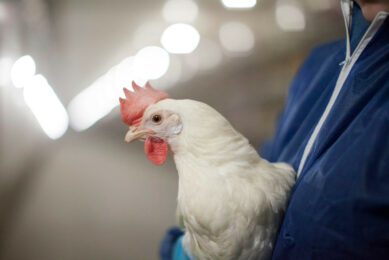Research: Influence of cereal type and dietary fibre on broiler performance
Researchers at the Department of Animal Production of the University of Murcia in Spain studied the influence of cereal type and the inclusion of sunflower meal as a source of additional dietary fibre on nutrient retention, growth performance and digestive organ size in broilers from one to twenty-one days of age.
Two experiments involving male Ross 308 broiler chicks were conducted to study the influence of type of cereal (sorghum or wheat) and the inclusion of sunflower meal (SFM) as a dietary fibre source on nutrient retention and growth performance.
The experiment involved two feeding periods, starter (1–10 d of age) and finisher (11–21 d of age) and four experimental diets per period.
Diets were factorial organized with two levels of sorghum in substitution of wheat (0 vs. 200 or 250 g sorghum/kg for the starter and finisher feeds, respectively) and two levels of SFM (0 vs. 40 or 25 g SFM/kg for each period).
Results
In Exp. 1, diet did not affect total tract apparent retention of nutrients. At 21 d of age, the coefficient of ileal apparent digestibility of starch was higher for the wheat than for the sorghum diets.
At 10 and 21 d of age, birds fed the sorghum diets had larger digestive tracts than chicks fed the wheat diets.
In Exp. 2, the inclusion of SFM impaired average daily gain (ADG) of birds from 1 to 10 days of age. From 11 to 21 d of age, birds fed the wheat diets had higher ADG than chicks fed the sorghum diets.
However, no differences in growth performance were observed for the entire experimental period.
Conclusion
The inclusion of 200 g sorghum/kg did not affect nutrient retention or growth performance during the first 10 d of life.
However, the inclusion of SFM reduced growth performance at this stage.
The inclusion of 250 g sorghum/kg reduced apparent ileal digestibility of starch and growth performance from 11 to 21 d of age.
The cereal type and the inclusion of SFM as a source of additional dietary fibre might affect digestive traits and growth performance of young broilers.
To view references and further reading you must purchase this article.











